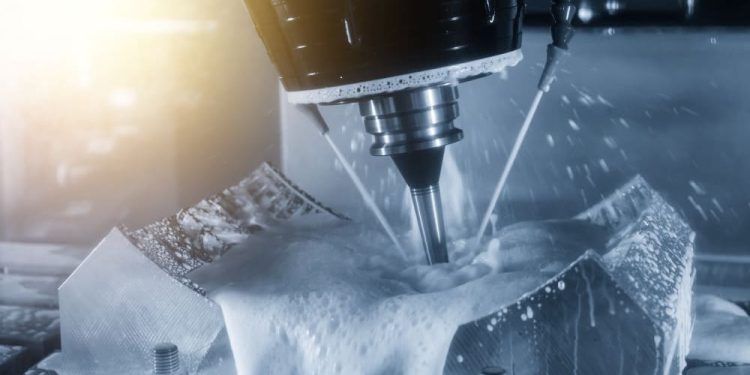The general notion about 5-axis CNC machining is that it is used by precision CNC machining services with large spaces, mainly for high-volume industrial production. However, this is only part of the picture, as businesses can choose a smaller version called a mini 5-axis CNC machine for versatility, space efficiency, and other machining advantages.
Efficient use of any 5-axis CNC machine requires understanding how it works. Hence, we introduce the 5-axis CNC mini machine. We will compare it with the industrial model before detailing how it works, its pros and cons, and specific applications.
Does a Mini 5-Axis CNC Machine Work?
Yes, mini 5-axis CNC machines work. However, it only depends on your project. They are perfect for small-scale projects like hobbyist operations, educational purposes, prototyping, and mini-machining. However, you should consider using industrial 5-axis CNC machines in large-scale 5-axis CNC machining.
What’s the Difference: Mini vs Industrial 5-Axis CNC Machine
Mini and industrial 5-axis CNC machines work on the same fundamental principle. However, as highlighted in this section, they significantly differ in size and capabilities, determining their applications. Here is a summary of the differences between both machines.
Size and Scale
Size and scale are the most distinct differences between an industrial and a mini 5-axis CNC machine. Although size and scale depend on the model and manufacturer, mini 5-axis CNC machines are smaller and more compact than the former.
A typical mini machine can have a work envelope of approximately 200 x 200 x 200 mm compared to an industrial 2000 x 2000 x 1000 mm. Their small-sized design makes them applicable in small precision machining services and more suitable for small-scale machining than the industrial 5-axis CNC machines designed for high-volume and more precise production.
Cost
Both precision CNC machines are expensive compared to the traditional models. However, a mini 5-axis CNC machine will likely be more affordable and accessible to hobbyists and small businesses than an industrial 5-axis CNC machine. The latter is more expensive because of its advanced features, higher precision, and durability.
Capabilities
A smaller size and scale means a mini 5-axis CNC machine has fewer advanced features and lower precision. Hence, it is only suitable for machining small parts that require lower tolerances. Industrial CNC machines have advanced automation systems compared to the mini 5-axis CNC machines.
Although 5-axis mini CNC machines might be more versatile than traditional 3-axis and even 4-axis CNC machines, industrial 5-axis CNC machines are more capable. As a result, they are the best for machining large parts with complex designs requiring high precision and repeatability.
Power and Speed
The size of the 5-axis mini CNC machine also means that it cannot house powerful technology like motors. A typical mini CNC machine can achieve up to 10,000 RPM compared to 30,000 RPM on an industrial machine. Furthermore, mini CNC machines have an average motor power of 500 watts, while other machines have several kilowatts.
As a result, it has lower speed capabilities than industrial machines, which have powerful motors and can operate at higher speeds. Power, speed, and industrial capability are responsible for the preference for industrial-scale 5-axis machines in large-scale production.
Pros and Cons of Mini vs Industrial 5 Axis CNC Machines
The difference between industrial and mini 5-axis CNC machines is summarized in the advantages and disadvantages highlighted below, which can help you choose the best 5-axis CNC machine for your project.
Mini 5-Axis CNC Machines
Pros
- Affordability: It has a lower initial investment, making it easily accessible to small businesses and hobbyists.
- Space-Efficient: Its compact size makes it fit into small workshops or classrooms.
- Ease of Use: It has user-friendly interfaces and software, making operating easier.
- Versatility: Ideal for prototyping and small-scale production of intricate parts.
Cons
- Limited Power: Less powerful motors restrict the size and type of machinable materials
- Lower Precision: Lesser precision compared to industrial manufacturing.
- Lower Production Speed: Slower machining speeds compared to industrial counterparts, affecting productivity.
Industrial 5-Axis CNC Machines
Pros
- High Precision: Capable of achieving extremely tight tolerances
- Powerful and Fast: High-powered motors and faster speeds improve productivity
- Durability: Built to withstand continuous, heavy-duty use in industrial environments.
- Advanced Features: Equipped with advanced software and automation capabilities for complex operations.
Cons
- Cost: Significant initial investment and higher maintenance costs.
- Space Requirements: A large footprint requires ample space in a manufacturing facility.
- Complexity: Requires skilled operators and extensive training to use effectively.
Mini 5 Axis CNC Machine
A mini 5-axis CNC machine’s design offers high precision and versatility on a smaller scale and at a more accessible price point. They are the ideal machine for hobbyists, small businesses, and educational purposes.
Applications
- Prototyping: Ideal for creating detailed prototypes and models in materials like plastics, wood, and soft metals.
- Jewelry Making: Precision and detail are required for intricate jewelry designs.
- Educational Use: A teaching tool for engineering and design students to understand CNC machining principles.
- Hobby Projects: Enables hobbyists to create custom parts and components for personal projects.
Industrial 5 Axis CNC Machine
Industrial 5-axis CNC machines are engineered for high-volume production and can machine complex parts with exceptional precision and speed. They are integral to aerospace, automotive, and medical device manufacturing.
Applications
- Aerospace: Manufacturing complex aircraft components with high precision and lightweight materials.
- Automotive: Machining engine parts, molds, and dies for high-performance vehicles.
- Medical Devices: Crafting intricate and precise components for medical equipment and implants.
- Tool and Die Making: Creating molds and dies for mass production of various products.
Conclusion
Both mini and industrial 5-axis CNC machines have their distinct advantages and applications. However, your choice depends on your needs, budget, and available space. Are you a hobbyist with a knack for creating intricate designs or a part manufacturer requiring high-volume precision machining? Understanding each type’s capabilities and limitations can help you make an informed decision and optimize your investment in CNC technology.






